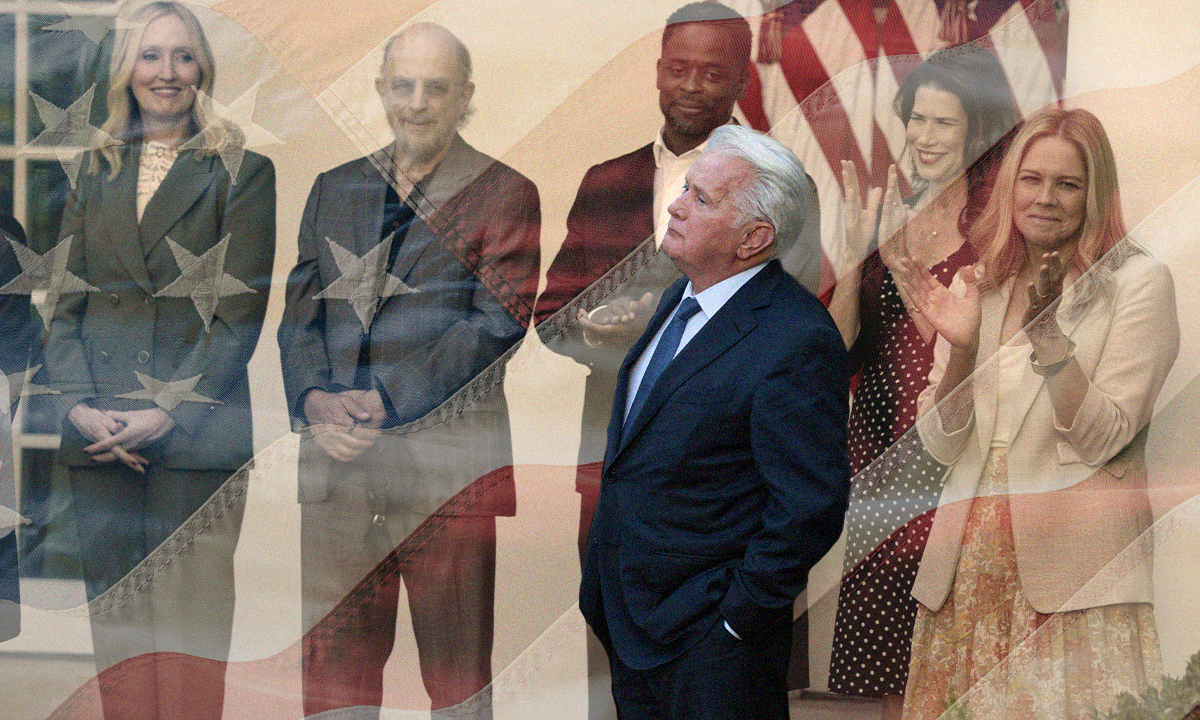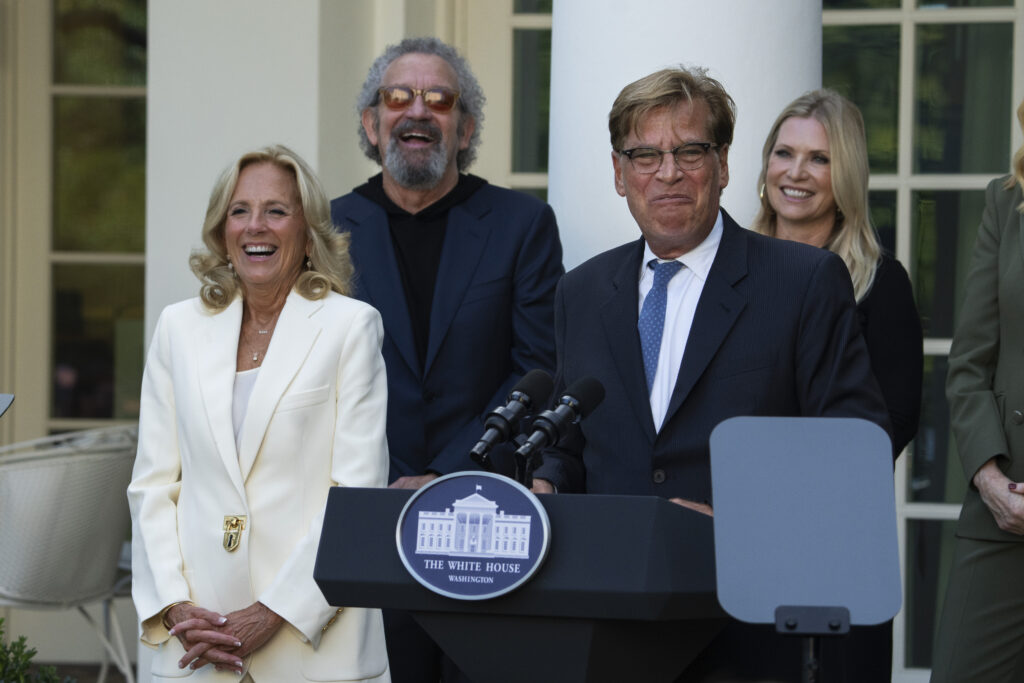The Ominous Return of Jed Bartlet
Why the current ‘West Wing’ renaissance is an unsettling omen for the Democrats. Actor Martin Sheen and other members of the cast of "The West Wing" attend an event in the Rose Garden at the White House on Sept. 20, 2024, to mark the 25th anniversary of the series. (AP Photo/Manuel Balce Ceneta)
Actor Martin Sheen and other members of the cast of "The West Wing" attend an event in the Rose Garden at the White House on Sept. 20, 2024, to mark the 25th anniversary of the series. (AP Photo/Manuel Balce Ceneta)
This September marked 25 years since the debut of Aaron Sorkin’s hugely popular NBC series, “The West Wing.” The anniversary’s arrival in the middle of an election season guaranteed it would get attention, but the extent, duration and intensity of its renaissance has been remarkable for a cable drama whose final episode aired during the presidency of George W. Bush. Star Martin Sheen made the rounds on NPR this summer, and a new book about the show — “What’s Next: A Backstage Pass to The West Wing, Its Cast and Crew, and Its Enduring Legacy of Service” — became an instant New York Times bestseller. New York’s Paley Center for Media put on a special two-month exhibit in tribute, inviting guests to come “Celebrate one of the most beloved TV presidential administrations of all time.” Anniversary events have been held at a number of Beltway institutions, from the Democratically aligned Center for American Progress to the White House, which held a soiree attended by Sorkin and several former cast members.
Of course, “The West Wing” never really went away. Since going off the air in 2006, it has remained a cultural touchstone and lodestar among many influential liberals and centrist cognoscenti, sustaining a fan base whose enthusiasm rivals any in the history of television. In the months prior to Hillary Clinton’s disastrous 2016 loss to Donald Trump, the debut of a podcast hosted by “West Wing” star Joshua Malina garnered millions of downloads (and went on to feature guest appearances by then-presidential candidate Pete Buttigieg and Canadian prime minister Justin Trudeau). Four years later, the cast reunited as part of a get out-the-vote effort featuring Bill Clinton and Michelle Obama. In definitive proof of God’s silence, there’s even a “West Wing”-themed rap by Lin-Manuel Miranda.
Plenty of series are warmly remembered years later, but “West Wing” fandom has always been in a smugly self-important galaxy of its own. This phenomenon begins at the top. Sorkin, America’s ur-weaver of dramas about smart-guy protagonists whose didactic monologues leave their hapless enemies in the dust, has never shied from making pompous interventions on behalf of Democratic elites. If “The West Wing” and its fandom has enjoyed such a singular longevity, the main reason is that it so perfectly projects the values of technocratic, establishment liberalism as we’ve known them since the Clinton era.
In “The West Wing” fantasy … the enemies are Bad Democrats who make principled stands against war and Social Security cuts.
Its world is one where the swift-tongued, Ivy League-educated operatives who occupy the corridors of power possess an effortless command of esoteric facts and policy details; where elite cooperation is an end in itself, and the way political institutions look and feel matters much more than their outcomes for ordinary people. In “The West Wing” universe, politics are mainly a struggle of the smart against the dumb, elections are rhetorical contests whose outcomes turn on epic debate moments, and genuine ideological commitment is an indulgence for the puritanical and politically immature.
An emblematic scene from the show’s second season finds Toby Ziegler (Richard Schiff) confronting a Democratic senator over his opposition to working with a Republican Congress to cut Social Security. “If you think demonizing people who are trying to govern responsibly is the way to protect our liberal base, then speaking as a liberal … go to bed, would you please?” says Ziegler. “Come at us from the left, and I’m gonna own your ass.” This is how politics always works in “The West Wing” fantasy: “serious” and “responsible” Democrats work with Good Republicans to Get Things Done. The enemies are Bad Democrats who make principled stands against war and Social Security cuts.
It’s an ethos that continues to gel neatly with the culture of the modern Democratic Party, where cloying appeals to social justice and inclusion have long sat comfortably alongside $5,000-a-plate Wall Street fundraisers, progressive populism is scorned, and the likes of George W. Bush and John McCain are viewed as benevolent elder statesmen. A Democratic Party that celebrates “The West Wing” is a Democratic Party that has evidently learned nothing from the past eight years.
Not content to let “The West Wing” remain in the world of fiction, Sorkin and many of the show’s leading cast members have often leveraged their on-screen personas to stump for the Democratic establishment and, when necessary, help it stave off challenges from the progressive left.
During the 2016 primaries, “West Wing” star Bradley Whitford — who portrayed the Rahm Emanuel-esque operative Josh Lyman — told MSNBC, “There’s no doubt in my mind that Hillary would be President Bartlet’s choice. On behalf of Jed Bartlet, I want to endorse Hillary Clinton.” Six members of the cast, including Whitford, were soon dispatched to Ohio to stump for Clinton, in what operatives presumably considered a masterstroke. (Shockingly, Hollywood actors from a decade-old NBC drama failed to persuade an electorate concerned about factory closures and outsourcing. Trump carried the state by more than eight points.)

During the same election cycle, Rob Lowe — who left the show in protest over his $75,000-per-episode salary — attacked Bernie Sanders’s tax plan by posting a clip of his “West Wing” character, Sam Seaborn, angrily lecturing a team of speechwriters: “Every time your boss got on the stump and said, ‘It’s time for the rich to pay their fair share,’ I hid under a couch and changed my name. … The top 1% of wage earners in this country pay for 22% of this country. Let’s not call them names while they’re doing it.” The real-life Lowe added the comment, “Watching Bernie Sanders. He’s hectoring and yelling at me WHILE he’s saying he’s going to raise our taxes. Interesting way to communicate.”
Little about Sorkin’s own politics have shifted since “The West Wing” went off the air and, if anything, he has only seemed to grow more dogmatic since the Clinton debacle of 2016. After writing two other shows with smugness quotients so off the charts they make “The West Wing” look earnest — “Studio 60 on the Sunset Strip” and “The Newsroom” — Sorkin’s most recent intervention in Democratic politics was his brilliant recommendation that the party run Mitt Romney in Joe Biden’s stead. “Surely Mr. Romney,” Sorkin wrote in a July 21 op-ed for the New York Times, “who doesn’t have to be introduced to voters, would peel off enough Republican votes to win, probably by a lot.”
Even for Sorkin, the argument was incredibly bizarre. Transitioning seamlessly from the piece’s whimsical premise (“How I Would Script This Moment for Biden and the Democrats”) to what was clearly intended as sage political advice, the author acknowledged that the former governor and 2012 Republican presidential candidate was not exactly in sync with the liberal priorities of the moment:
“Does Mr. Romney support abortion rights? No. Does he want to aggressively raise the minimum wage, bolster public education, strengthen unions, expand transgender rights and enact progressive tax reform? Probably not. But is he a cartoon thug who did nothing but watch TV while the mob he assembled beat and used Tasers on police officers? No. The choice is between Donald Trump and not-Trump, and the not-Trump candidate needs only one qualification: to win enough votes from a cross section of Americans to close off the former president’s Electoral College path back to power.”
Nonetheless, Sorkin argued, nominating Romney at the DNC would be an act of generation-defining selflessness and courage that — when paired with some soaring oratory from Barack Obama — would guarantee Trump’s defeat in a landslide worthy of a series finale. “Mr. Romney could make the case that the Democrats are putting country before party in ways that the MAGA movement will not, and announce his bipartisan cabinet picks at the convention as well,” he wrote. “It’s a grand gesture. A sacrifice. It would put a lump in our throats. But mostly, it would be the end of Donald Trump in presidential politics.”
Fortunately for Sorkin, the op-ed was eclipsed (and hastily retracted) within a few hours of publication following news that Biden was suspending his campaign and endorsing his vice president.
This year’s DNC featured a mixture of jingoism and centrist posturing that Sorkin himself could have scripted.
But while Americans will regrettably never live to see a Romney presidential campaign under the Democratic aegis as Sorkin imagined it, both the sentiment it expressed and “The West Wing’s” ongoing renaissance feel like bleak statements on the current moment. The Kamala Harris/Tim Walz campaign is proudly touting a veritable murderer’s row of Republican support. Liz Cheney is quite literally stumping for the Democrats in Wisconsin and, upon receiving the endorsement of her father — prominent torture enthusiast and war criminal Dick Cheney — Harris remarked that she was “honored.” Former staffers for Ronald Reagan — the man who successfully destroyed the New Deal and Made America Great Again before it was cool — have come out for Harris too, saying that their former boss would have eagerly done the same.
This year’s DNC, meanwhile, featured a mixture of jingoism and centrist posturing that Sorkin himself could have scripted. As U.S.-supplied bombs continued to rain down on Gazan refugees in tents, the vice president pledged to maintain “the most lethal military in the world” while partisan Democrats celebrated “brat summer.” Pivoting sharply from past progressive positions, Harris is instead brandishing her commitment to “private healthcare options,” all while swinging hard to the right on immigration and border policy, and campaigning as a self-described “pragmatist” who is not “bound by ideology.”
In effect, as Katherine Kreuger puts it, Democratic voters are “being asked to set aside core tenets of progressivism to electorally defeat Trump” in an exact repeat of the catastrophic moral calculus that enabled him to win the first time. With a weaker opponent, a better running mate and more trips to Wisconsin, it’s a strategy that might win Harris the 270 electoral votes that eluded Hilary Clinton, or it might not. Either way, it’s emblematic of a party whose leaders and fiercest partisans remain stubbornly committed to the pallid technocratic vision bequeathed to them by a generation raised on Jed Bartlet.
Twenty-five years after its debut in the twilight of Bill Clinton’s conservatively inclined and morally compromised presidency, it feels like “The West Wing” has only become a more apt depiction of establishment liberalism and its pathologies. It is the perfect centrist fairy tale for an age of crumbling institutions and elite triangulation; a smirking fable without peer that somehow continues to script our reality from beyond the grave.
Your support is crucial...As we navigate an uncertain 2025, with a new administration questioning press freedoms, the risks are clear: our ability to report freely is under threat.
Your tax-deductible donation enables us to dig deeper, delivering fearless investigative reporting and analysis that exposes the reality beneath the headlines — without compromise.
Now is the time to take action. Stand with our courageous journalists. Donate today to protect a free press, uphold democracy and uncover the stories that need to be told.
You need to be a supporter to comment.
There are currently no responses to this article.
Be the first to respond.